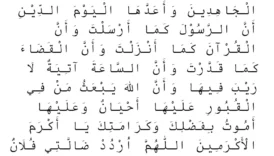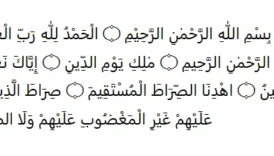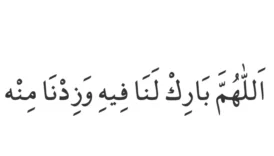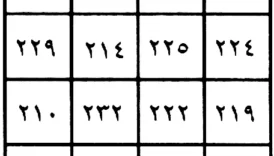The Prayer of Prophet Yunus And Its Virtue
What is the secret and virtue of the famous prayer Prophet Yunus made inside the belly of the fish? What glad tidings are given in the Hadith about this prayer? How should it be recited for relief from distress?
- The Prayer of Prophet Yunus And Its Virtue
- The Prayer Of Prophet Yunus (a.s.) In The Belly Of The Fish
- Transliteration And Meaning Of The Prayer
- The Virtues Of The Prayer In Hadith
- Glad Tidings Of Relief From Distress And Hardship
- Regarding The Definite Acceptance Of The Prayer
- Recommended Ways Of Recitation For Specific Situations
- For Healing And Recovery From Illness (40 Times)
- For Acceptance Of Needs (40 Times in Prostration)
- For General Needs (40 Times in Prostration After Prayer)
- Against All Kinds Of Sorrow And Grief (Narration of Al-Hafiz)
- For Position And Rank (41 Times / 40 Days)
- Benefits Of Reciting 1000 Times Daily
- The Secret To Acceptance: Faith (Itiqad) And Submission (Taslimiyyah)
- Final Thoughts
In our life journey, we all occasionally feel constrained, distressed, and face difficulties that seem insurmountable. It is precisely at such moments that turning to our Lord, seeking His help, and taking refuge in His infinite mercy becomes our greatest solace. The lives of the prophets offer us the best examples in this regard. Their patience, trust in God, and devotion to Allah even in the most difficult moments are sources of light for us. One of these prophets is Prophet Yunus (Jonah, peace be upon him), who holds a special place in our hearts due to the extraordinary event he experienced and the famous prayer he made. His prayer within the belly of the fish has become a litany on the tongues of believers facing hardship throughout the ages, carrying a hope for salvation.
The Prayer Of Prophet Yunus (a.s.) In The Belly Of The Fish
Prophet Yunus’s trial began when he left his people in anger without Allah’s permission, boarded a ship, drew the short straw, and was thrown into the sea. He was swallowed by a large fish (often depicted as a whale) by Allah’s command. However, the fish did not harm him. It was in this dark and confined space, in the depths of the sea, inside the belly of the fish, that Prophet Yunus realized his mistake and turned to his Lord with all sincerity, pleading with Him using these blessed words:
Transliteration And Meaning Of The Prayer
Arabic Text:
لَٓا اِلٰهَ اِلَّٓا اَنْتَ سُبْحَانَكَ اِنّ۪ي كُنْتُ مِنَ الظَّالِم۪ينَۚ
Transliteration:
Lâ ilâhe illâ ente sübhâneke innî küntü mine’z-zâlimîn.
Meaning:
“…There is no deity except You; exalted are You. Indeed, I have been of the wrongdoers!”
This brief yet profound prayer encompasses three fundamental pillars of faith: Tawhid (affirming the Oneness of Allah), Tasbih (glorifying Allah and declaring Him free from imperfections), and Tawbah/I’tiraf (Repentance/Confession – admitting one’s fault and seeking forgiveness). It is a supplication that most eloquently expresses the servant’s helplessness and the Lord’s greatness.
The Virtues Of The Prayer In Hadith
Prophet Muhammad (peace and blessings be upon him) informed us that this prayer of Prophet Yunus was not exclusive to him but serves as a prescription for salvation from distress for all believers. Significant glad tidings regarding the virtue of this prayer are found in the Hadith.
Glad Tidings Of Relief From Distress And Hardship
Sa’d ibn Abi Waqqas (may Allah be pleased with him) narrated that the Messenger of Allah (peace and blessings be upon him) said: “The supplication of Dhun-Nun (Prophet Yunus) when he supplicated, while in the belly of the fish was: ‘Lâ ilâhe illâ ente sübhâneke innî küntü mine’z-zâlimîn.’ No Muslim man supplicates with it for anything whatsoever, but Allah responds to him.” (Tirmidhi, Da’awat, 81; Ahmad ibn Hanbal, Musnad, I, 170; Hakim, Al-Mustadrak).
In another narration, the Prophet (pbuh) said: “I know a word that, if any person afflicted with distress or hardship says it, he will surely be relieved of that distress and hardship. It is the word of my brother Yunus. He called out in the darkness, saying: ‘Lâ ilâhe illâ ente sübhâneke innî küntü mine’z-zâlimîn.’” (Ibn al-Sunni, Amal al-Yawm wa al-Layla).
These hadiths clearly show that the prayer is a powerful means for salvation from distress, hardship, trouble, and affliction, by the permission of Allah.
Regarding The Definite Acceptance Of The Prayer
A more detailed narration concerning the acceptance of Prophet Yunus’s prayer is also reported by Sa’d ibn Malik (r.a.): I heard the Prophet (pbuh) say: “The Name of Allah, the Mighty and Majestic, (is such a name that) if He is called upon by it, He answers, and if He is asked by it, He gives. It is the supplication made by Yunus ibn Matta.” Upon this, I asked: “O Messenger of Allah! Is this prayer specific to Yunus ibn Matta, or can the Muslim community also benefit from it?” He replied: “- It is specific for Yunus ibn Matta in a special sense, and general for Muslims in a general sense. Muslims benefit when they supplicate with it.” Then he added: “Have you not heard the statement of Allah?: ‘And he called out within the darknesses, ‘Lâ ilâhe illâ ente sübhâneke innî küntü mine’z-zâlimîn.’ So We responded to him and saved him from the distress. And thus do We save the believers.’ (Al-Anbiya, 87-88). This is a condition from Allah (regarding His acceptance) for those who present their case with that prayer.” (Ahmad ibn Hanbal, Musnad; Tirmidhi, Da’awat; Nasa’i; Hakim; Bayhaqi).
This narration confirms that the prayer is not a favor exclusive to Prophet Yunus, but that every believer who makes this prayer with the same sincerity and faith can also attain Allah’s help and salvation. The phrase in the verse “And thus do We save the believers” is evidence that this prayer is a valid means of salvation for the Ummah as well.
Recommended Ways Of Recitation For Specific Situations
In hadiths and the experiences of scholars, there are also recommendations for reciting this prayer for specific needs and situations:
For Healing And Recovery From Illness (40 Times)
It is narrated: “If any sick person makes supplication with this prayer and presents his case with it 40 times, he will definitely be given the reward of a martyr. If he recovers from the illness, his sins will also be forgiven.” This narration indicates that reciting this prayer 40 times with the intention of healing for the sick increases one’s spiritual rank and can be a means of healing by Allah’s permission.
For Acceptance Of Needs (40 Times in Prostration)
According to a narration from some righteous individuals, a pious person saw the Messenger of Allah (pbuh) in a dream and asked: “- O Messenger of Allah! I have a need from my Allah. How can I reach Him?” The Prophet of Mercy gave him this answer: “- Whoever has a need from Allah should prostrate and say in his prostration forty times, while also pointing with his finger: ‘Lâ ilâhe illâ ente sübhâneke innî küntü mine’z-zâlimîn’. His prayer will certainly be accepted.” (Source: Al-Durr al-Nazim fi Khawass al-Qur’an al-‘Azim). This narration suggests that this remembrance, especially when made during prostration (sajdah), is an effective way for prayers to be accepted.
For General Needs (40 Times in Prostration After Prayer)
Another hadith recommends the following: “Whoever is in dire need (mudtar) regarding something should perform ablution (wudu). Let him perfect his ablution. Let him pray 2 rak’ahs and give salam. After the prayer, let him prostrate and say: ‘Lâ ilâhe illâ ente sübhâneke innî küntü mine’z-zâlimîn’. Let him repeat this 40 times and then present his request. Wherever and whenever he desires, Allah will accept his prayer accordingly. However, doing this at midnight is better, more beautiful.” This method suggests performing this remembrance 40 times in prostration after performing ablution and two rak’ahs of prayer for general needs, and then making the request. The virtue of performing it at midnight is also highlighted.
Against All Kinds Of Sorrow And Grief (Narration of Al-Hafiz)
In a narration from Al-Hafiz (may Allah have mercy on him), it is said: I came across a sealed document kept in the archive of a ruler. I broke the seal and saw this writing right on the document: “This is a cure against all kinds of sorrow and grief.” A person gets up at night, performs ablution, prays two rak’ahs, then raises his hands and makes the following supplication: “O Allah! Verily, Dhun-Nun (Prophet Yunus) was Your servant and Your prophet. He prayed to You because of a harm and distress that touched him, and called out from the belly of the fish: ‘Lâ ilâhe illâ ente sübhâneke innî küntü mine’z-zâlimîn.’ And You bestowed upon him the answer: ‘We responded to him and saved him from the distress. And thus do We save the believers…’ Verily, I am also Your servant and the son of Your maidservant (so-and-so woman), my forelock is in Your hand. I pray to You because of an evil, a harm that has touched me. I present my problem to You and I say what Yunus (a.s.) said: ‘Lâ ilâhe illâ ente sübhâneke innî küntü mine’z-zâlimîn…’ Accept my prayer as You accepted the prayer of Yunus (a.s.). Save me from sorrow and grief as You saved him. For You have power over all things and You never break Your promise.” This lengthy supplication shows a method of asking for Allah’s help by reminding oneself of one’s own helplessness and the situation of Prophet Yunus.
For Position And Rank (41 Times / 40 Days)
Another method, narrated to have been taught by some Naqshbandi shaykhs, is as follows: “Whoever falls into difficulty regarding something, is unable to obtain it or repel it, or has been dismissed from his position and wishes to return to it, should recite the mentioned verse (Al-Anbiya, 87) exactly 41 times. He should neither increase nor decrease this number. He should not insert any worldly talk in between. However, he should continue reciting this after every morning prayer for 40 days. He should be careful not to miss any day. When 40 days are completed, let him see what the situation is. Let him pay attention to how it is.” It is mentioned that this method has been experienced many times for achieving success in matters like position, rank, or overcoming a difficulty. The conditions of complete faith (itiqad) and continuation for 40 days without interruption are emphasized.
Benefits Of Reciting 1000 Times Daily
According to some experts in Havas: “Whoever recites ‘Lâ ilâhe illâ ente sübhâneke innî küntü mine’z-zâlimîn’ 1000 times every day and requests the rank and station he desires, he will surely attain it. Allah will expand his provision, remove his sorrow and grief, open the doors of many blessings for him, and protect him from the evil of devils and oppressive rulers. He will be beloved among the friends of Allah and inspire awe in his enemies. Because the one who recites this (knowingly and resorting to means) knows his own shortcomings.” This narration points to the general spiritual and worldly benefits of making this remembrance a daily practice (wird).
The Secret To Acceptance: Faith (Itiqad) And Submission (Taslimiyyah)
The common point in all these narrations is the sincerity, complete faith (itiqad), and submission (taslimiyyah) to Allah required for the acceptance of the prayer. It is essential for the person reciting this prayer to be aware of their own helplessness and flaws and to take refuge in Allah’s infinite power and mercy. Believing wholeheartedly in Allah Almighty’s promise “And thus do We save the believers” is the most important factor that enhances the effectiveness of the prayer.
Final Thoughts
The prayer of Prophet Yunus (a.s.), “Lâ ilâhe illâ ente sübhâneke innî küntü mine’z-zâlimîn,” is a blessed legacy that guides us in difficult times and teaches us how to seek refuge in our Lord. Established by the Qur’an and Sunnah, this supplication, with its profound meanings and virtues heralded in the hadiths, is a treasure that should reside in the heart and on the tongue of every believer. Whatever the intention and method of recitation, what is essential is sincerity from the heart, repentance for sins, and never losing hope in Allah’s mercy. May our Lord, through the blessings of this prayer, count us among His believing servants whom He saves from distress.
Bibliography
- The Holy Qur’an. (Especially Surah Al-Anbiya 87-88, Surah As-Saffat 139-148).
- Al-Tirmidhi, Muhammad ibn ‘Isa. Sunan al-Tirmidhi. (Hadith Collection, Book of Supplications).
- Ahmad ibn Hanbal. Al-Musnad. (Hadith Collection).
- Al-Hakim al-Naysaburi, Abu Abdillah Muhammad ibn Abdillah. Al-Mustadrak ‘ala al-Sahihayn.
- Ibn al-Sunni, Abu Bakr Ahmad ibn Muhammad. ‘Amal al-Yawm wa al-Layla.
- Al-Nasa’i, Abu ‘Abd al-Rahman Ahmad ibn Shu’ayb. Al-Sunan al-Kubra.
- Al-Bayhaqi, Abu Bakr Ahmad ibn al-Husayn. Shu’ab al-Iman.
- Al-Daylami, Shahradar ibn Shirawayh. Al-Firdaws bi-Ma’thur al-Khitab (It is possible that “Al-Durr al-Nazim” refers to this work or a similar compilation, but precise identification is difficult).
- Ibn Kathir, ‘Imad al-Din Abu ‘l-Fida Isma’il ibn ‘Umar. Tafsir al-Qur’an al-‘Azim.
- Al-Suyuti, Jalal al-Din. Al-Jami’ al-Saghir min Hadith al-Bashir al-Nadhir.





